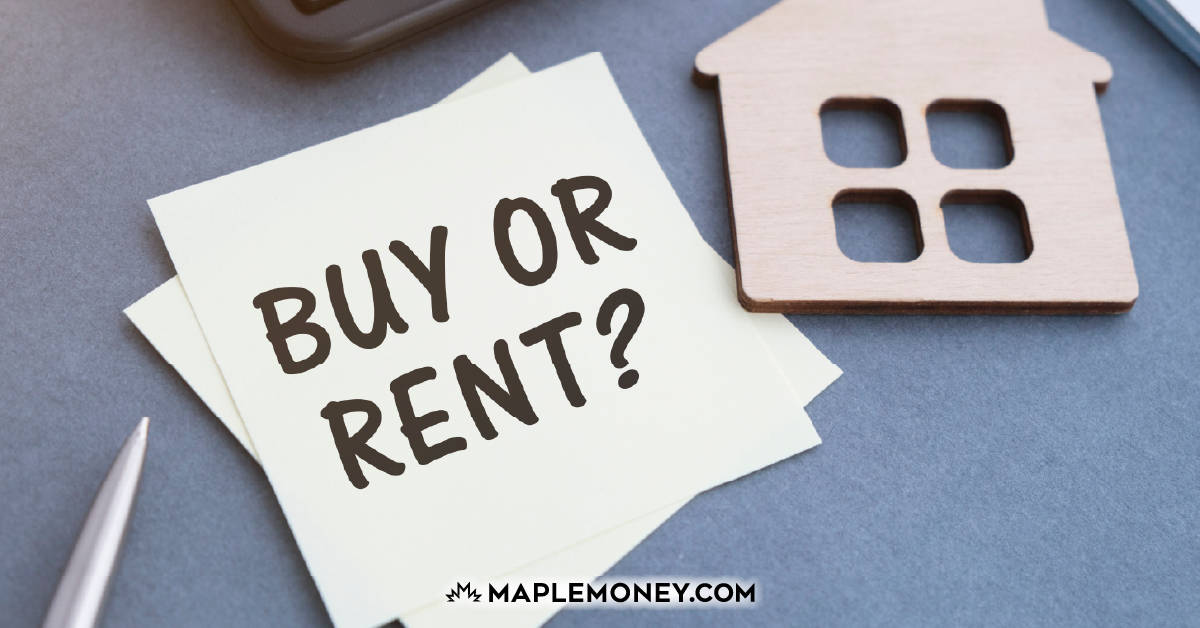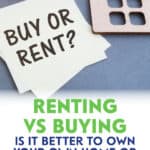Renting vs Buying: Is it Better to Own Your Home or Continue Renting?

You can be forgiven for assuming it’s always better to buy a home than rent. After all, Canadian housing prices have been steadily rising in almost every part of the country for over a decade, while interest rates have remained at historic lows during the same period.
Enter 2022.
Beginning in March, to contain soaring inflation (including out-of-control housing prices), the Bank of Canada announced the first in a series of increases to its key interest rate. At the time of this writing, the Target Overnight Rate has increased by 2.25%, with economists forecasting further increases in the fall.
While the full impact of the Bank of Canada’s rate action has yet to play out, there has already been a pullback in housing values in many large cities, including the GTA. At the same time, mortgage rates have risen sharply during the same period. In the spring of 2021, you could get 1.5% on a 5-year closed-term mortgage. Today, the same 5-year term is more than 5%.
All of this begs the question – is it better to own your home or rent, and have recent events swung the argument to one side or the other? The answer is complicated.
Pros and Cons of Buying a Home
Advocates of home ownership have plenty of ammo in the rent vs. buy debate: you’re building equity into an appreciating asset, you have full control to do what you want with the property, and, depending on where you live, your monthly mortgage payment may be less than what you would pay in rent. But owning a home also has its drawbacks. Let’s take a closer look at some home ownership pros and cons.
Pros:
Build home equity: Over the long run, you’ll appreciate the equity you’ve built into your home. The best part is that you won’t have to pay capital gains on your investment when you sell, as it’s your principal residence.
Control: As the homeowner, you have full control over your home. You don’t need permission from a landlord to paint the walls or replace the carpet. If you want to embark on a full renovation, that’s up to you.
Stability: While renting offers greater flexibility, homeownership is more stable. You won’t find yourself in a situation where you have to move because the owner has decided to sell the property; you are the owner.
Cons:
Upfront costs: Homeownership comes with several unrecoverable expenses. In other words, you won’t get your money back. These include legal fees and other closing costs, land transfer tax, realtor fees (when you sell), property taxes, CMHC Insurance (if applicable), condo fees (if applicable), home insurance, etc. You don’t have these costs when you rent.
Down payment: Before buying a home, you need to come up with a down payment of at least 5%. To avoid paying costly CMHC insurance premiums, you’ll need to save 20% or more as a down payment. On a $400,000 house purchase price, that’s $80,000. If you rent, you can use this money to save for other purposes, like retirement or your child’s education.
Maintenance Costs: As a homeowner, you’re responsible to pay 100% of your home’s maintenance costs. This includes minor repairs, like patching a hole in the wall or replacing a doorknob, to the big stuff, like roof repairs, new windows, or a furnace.
Can interfere with short-term plans: If you encounter an unexpected change in your short-term plans, like a job transfer or marital split, you may feel stuck if you suddenly need to sell. You may find yourself at the mercy of the real estate market.
Pros and Cons of Renting a Home
Pros:
Flexibility: This is one of the primary advantages of making rent payments instead of mortgage payments. Renting gives you the flexibility to move at any time. Whether you get a new job in a different city, encounter a relationship change, have a child, or just grow tired of where you’re living, you can decide to move anytime without worrying about the housing market and other considerations when selling a home.
Few upfront expenses: Aside from paying a damage deposit or first and last month’s rent when you move in, there are almost no upfront expenses when renting your home. No closing costs, like legal fees and land transfer taxes, etc. There are also no property taxes or regular maintenance costs – just the monthly rent.
Cheaper than getting a mortgage (in the short-term): While the benefits of home ownership increase in the long run, rental costs are far lower than housing costs during the first couple of years. When you rent, you have a single monthly expense (excluding utilities or renter’s insurance). Homeowners must come up with a down payment and shoulder thousands of dollars in unrecoverable costs I mentioned previously.
No Repair Costs: Renters don’t have to worry about paying for home repairs. When things need to be fixed, the property owner covers the expense. The only downside might be having to wait for repairs and not having control over maintenance timing.
Cons:
Dealing with rent increases: While local governments can and do place restrictions on rental increases, you may find yourself in a situation where the property owner can increase your monthly rent. This can have an impact on your cash flow and may even cause you to have to move.
You can’t build equity: While I don’t necessarily agree with the idea that a mortgage is like a forced savings account if you decide to rent instead of buying a house, you lose the opportunity to build equity in a property.
Renting Versus Buying: Which One Should You Choose?
The choice between renting or buying can be a difficult financial decision, and the correct answer depends on the individual. However, if I apply a general rule, I would say that with all else being equal, buying is the better option if you plan to stay in your home for the long term, say five years or more. If you live in an area where houses tend to appreciate, you should be able to build enough equity to overcome the upfront costs and any market fluctuations.
I would consider renting if you plan to stay in the home for two years or less. The initial costs of buying a home are simply too significant, and there’s a risk that you won’t come out ahead if you have to sell, regardless of where you live. If you don’t believe this, just look at the current housing market (summer 2022).
Imagine that you purchased a home in Toronto in early 2022, with a plan to sell within two years. Between February and July, the average price of a home in the GTA dropped by 20%. That’s an average price drop of $260,000 in five months. What was unthinkable only a year ago is suddenly a cold, hard reality for people who plan to sell soon.
The market will recover, but how long will that take? One year? Three years? Five? The Bank of Canada has recently indicated that interest rates must continue to rise, and high inflation impedes Canadian families’ disposable income from coast to coast.
Rent vs. Buy: The Bottom Line
The bottom line in the rent vs. buy debate is that either can be the better choice. It depends on many factors, such as housing markets, current interest rates, disposable income, long-term plans, etc.
If at all possible, one thing you should avoid is becoming house-poor, aka buying or renting a home that you truly can’t afford. If a potential mortgage or rent payment is so high that it will restrict you from doing other things, like travelling, saving for retirement, or just covering the bare essentials, it’s not a good deal.


Comments
I think another con of renting is the possibility of having to vacate unexpectedly. While there are protections in place to mitigate this it’s a definite possibility.